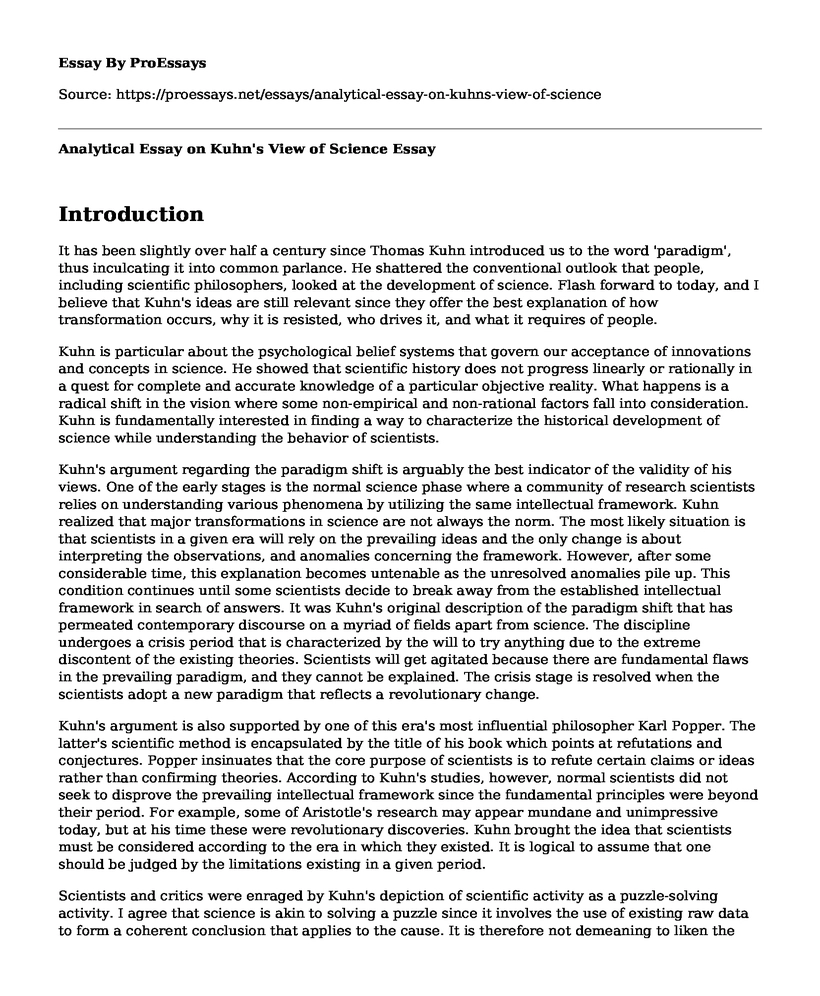Introduction
It has been slightly over half a century since Thomas Kuhn introduced us to the word 'paradigm', thus inculcating it into common parlance. He shattered the conventional outlook that people, including scientific philosophers, looked at the development of science. Flash forward to today, and I believe that Kuhn's ideas are still relevant since they offer the best explanation of how transformation occurs, why it is resisted, who drives it, and what it requires of people.
Kuhn is particular about the psychological belief systems that govern our acceptance of innovations and concepts in science. He showed that scientific history does not progress linearly or rationally in a quest for complete and accurate knowledge of a particular objective reality. What happens is a radical shift in the vision where some non-empirical and non-rational factors fall into consideration. Kuhn is fundamentally interested in finding a way to characterize the historical development of science while understanding the behavior of scientists.
Kuhn's argument regarding the paradigm shift is arguably the best indicator of the validity of his views. One of the early stages is the normal science phase where a community of research scientists relies on understanding various phenomena by utilizing the same intellectual framework. Kuhn realized that major transformations in science are not always the norm. The most likely situation is that scientists in a given era will rely on the prevailing ideas and the only change is about interpreting the observations, and anomalies concerning the framework. However, after some considerable time, this explanation becomes untenable as the unresolved anomalies pile up. This condition continues until some scientists decide to break away from the established intellectual framework in search of answers. It was Kuhn's original description of the paradigm shift that has permeated contemporary discourse on a myriad of fields apart from science. The discipline undergoes a crisis period that is characterized by the will to try anything due to the extreme discontent of the existing theories. Scientists will get agitated because there are fundamental flaws in the prevailing paradigm, and they cannot be explained. The crisis stage is resolved when the scientists adopt a new paradigm that reflects a revolutionary change.
Kuhn's argument is also supported by one of this era's most influential philosopher Karl Popper. The latter's scientific method is encapsulated by the title of his book which points at refutations and conjectures. Popper insinuates that the core purpose of scientists is to refute certain claims or ideas rather than confirming theories. According to Kuhn's studies, however, normal scientists did not seek to disprove the prevailing intellectual framework since the fundamental principles were beyond their period. For example, some of Aristotle's research may appear mundane and unimpressive today, but at his time these were revolutionary discoveries. Kuhn brought the idea that scientists must be considered according to the era in which they existed. It is logical to assume that one should be judged by the limitations existing in a given period.
Scientists and critics were enraged by Kuhn's depiction of scientific activity as a puzzle-solving activity. I agree that science is akin to solving a puzzle since it involves the use of existing raw data to form a coherent conclusion that applies to the cause. It is therefore not demeaning to liken the critical scientific process to solving a crossword puzzle. The two share similar characteristics such as the need for sustained effort, patience, and ingenuity.
Conclusion
I agree with Kuhn's ideas on the development of science since they are self-explanatory. He avoids the philosophical route and takes a pragmatic approach to explain how scientific ideas transform into new ideologies.
Cite this page
Analytical Essay on Kuhn's View of Science. (2022, Apr 14). Retrieved from https://proessays.net/essays/analytical-essay-on-kuhns-view-of-science
If you are the original author of this essay and no longer wish to have it published on the ProEssays website, please click below to request its removal:
- Written Assignment on Math
- Letter About Relationship Between Copper and Zinc
- Atomic Nuclear Decay and Uses of Radioactivity in Healthcare Paper Example
- Essay Sample on Approaches to Improve Math Scores
- Research Paper on Exploring the Development of Early Cities: The Archeology of Jericho and Catalhoyuk
- Unveiling the Chemistry Connection: Physical Attraction & Social Interactions - Essay Sample
- Essay Example on Calculating Drink Mix Mass for 0.24L Solution







